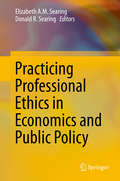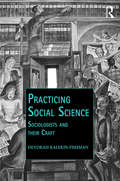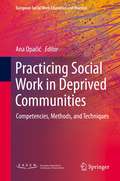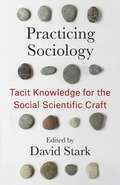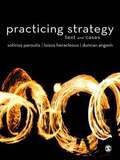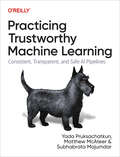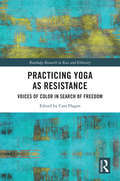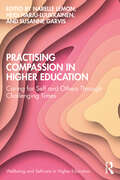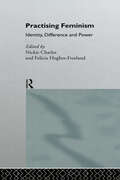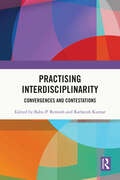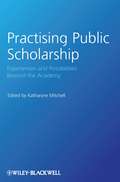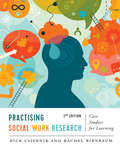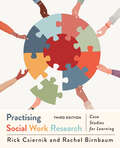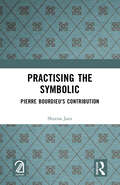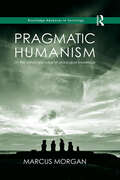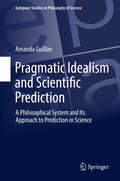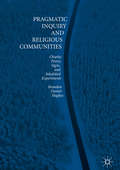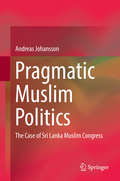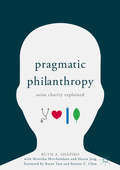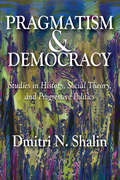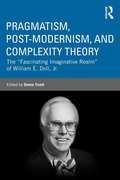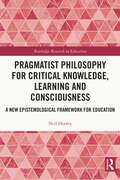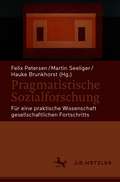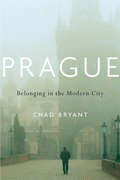- Table View
- List View
Practicing Professional Ethics in Economics and Public Policy
by Elizabeth A.M. Searing Donald R. SearingThis volume explores the professional ethics of addresses the varied ethical needs of the professional economists and public policy professionals. Using terms and methods familiar to the reader, the book goes beyond the typical narrative of economics and morality to walk the professional through the process of ethical decision-making. Designed to be easy to navigate and applicable to everyday practice, this book includes a step-by-step illustrated guide through an ethical decision-making process using a methodology specifically tailored to economists and policy professionals. It describes numerous unique ethical tests and resolution methods which are utilized in a portfolio structure. The book also includes a brief and convenient catalogue of important figures in philosophy and ethics, translated into their policy applications; it concludes with candid advice from experts in different subfields on how ethics impacts their professional lives. This volume provides a foundation and framework for those in economics and public policy to implement a relevant practice of professional ethics both at and in their work.
Practicing Social Science: Sociologists and their Craft (Public Intellectuals and the Sociology of Knowledge)
by Devorah Kalekin-FishmanHow is the process of globalization effecting changes in the structure of knowledge in sociology? This path-breaking volume looks at the human dimension of developments in the discipline by compiling a set of interviews that exemplify the life and work of a sociologist today. Their ideas and conceptualizations show to what extent a "paradigm shift" has taken root, answering questions such as whether sociology still remains a differentiated, relatively autonomous social science. The chosen interviewees are about equally divided according to gender and have been selected from among professional sociologists in different parts of the globe, with an emphasis on areas that are under-represented in English publications, such as East Asia, Latin America, and Africa. Analysis focuses on changes which are becoming clear from the on-going confrontation between "traditional" sociology which emerged as a project of modernity, and the sociology practiced by sociologists who are called upon to adapt the discipline to the upheavals of the twenty-first century.
Practicing Social Work in Deprived Communities: Competencies, Methods, and Techniques (European Social Work Education and Practice)
by Ana OpačićThis contributed volume offers a holistic understanding of social work practice in deprived communities through its thematization of understanding deprived communities globally, the development of competencies for social work practice in and with deprived communities, social work education as a community development tool, and the empowerment of social workers in deprived communities. Inequality as a globally recognized challenge is extensively elaborated within the UN Sustainable Development Goals (SDGs) and the Global Agenda program for social work, making this a timely and important contribution to the literature. Deprived communities, used in this book to mean slums, ghettos, favelas, and low-income, remote, underserved, vulnerable, impoverished, underdeveloped, disadvantaged, or less-favoured communities, exist worldwide and are conceptualized under different terms and concepts. For that reason, social work, specifically in deprived areas, is not sufficiently recognized as a specific field of practice within community work. As a result, this volume features contributions that:provide a conceptual clarification of many different terms that are used for describing deprived communities and offer a systematic literature review on community processes and effects on well-being in underdeveloped communities;map different fields of social work involvement in deprived communities with concrete practice examples; and,stress why social work as a profession needs support and how it can be empowered to improve its capacities in deprived communities. With international authorship and perspectives on social work approaches for deprived communities from India, Sub-Saharan Africa, North and Central Europe, and North America, Practicing Social Work in Deprived Communities is an essential resource for social workers, social work educators, and community development practitioners. The text also should be of interest to students of social work, as well as other professionals and researchers working within community development and deprived communities.
Practicing Sociology: Tacit Knowledge for the Social Scientific Craft
by David StarkThroughout their careers, social scientists must come up with compelling research topics, decide when and where to publish, and revise their manuscripts for publication. Despite the importance of these skills, they are seldom if ever addressed in the course of graduate training. Heavy emphasis is placed on conducting research, and other core activities such as teaching also receive attention, yet fundamental academic practices are left almost entirely in the shadows.Practicing Sociology brings together a range of leading sociologists to reflect on their work and demystify this tacit knowledge. In conversational and engaging essays, they provide practical guidance and hard-won wisdom for readers at any stage of their scholarly careers. The book’s three sections explore the art of finding new research questions, best practices in publishing, and how to make the most out of the peer review process. Contributors’ distinctive voices come through as they recount their frustrations and failures as well as the joys of the sociological craft. They provide a range of perspectives, underscoring that there is no one “right” way to practice sociology but a constellation of different approaches that together give the field its vitality.Practicing Sociology features a team of skilled scholars including Peter Bearman, Paul J. DiMaggio, Wendy Espeland, Marion Fourcade, Shamus Rahman Khan, Eric Klinenberg, Michèle Lamont, Jennifer Lee, Mignon Moore, Mario Small, Duncan Watts, and many more.
Practicing Strategy
by Loizos Heracleous Duncan Angwin Sotirios Paroutis*Shortlisted for the CMI Management Book of the Year*<P><P> Practicing Strategy is a groundbreaking new textbook focusing on the strategy-as-practice approach, which considers strategy not only as something an organisation has but something which its members do.<P> By bringing together a number of distinctive investigations of strategy practice, this book will enrich your understanding of the dynamic process through which organizational strategies are created and executed.<P> Key features:<P> * The first textbook to be based on insights from the strategy-as-practice perspective, making it an ideal core text for related modules <P> * Packed with real-life mini case studies and a final section containing longer cases from Apple, Centrica, Marconi, Lafarge and Wikimedia, relating theory to practice <P> * Chapters include learning objectives, summaries, discussion questions and further readings and a Companion Website contains additional online readings, to consolidate your learning and encourage in-depth analysis. <P> Practicing strategy is an invaluable text for undergraduate and postgraduate students of advanced strategy modules. <P> Visit the Companion Website at www.sagepub.co.uk/paroutis
Practicing Trustworthy Machine Learning: Consistent, Transparent, and Fair AI Pipelines
by Yada Pruksachatkun Matthew Mcateer Subho MajumdarWith the increasing use of AI in high-stakes domains such as medicine, law, and defense, organizations spend a lot of time and money to make ML models trustworthy. Many books on the subject offer deep dives into theories and concepts. This guide provides a practical starting point to help development teams produce models that are secure, more robust, less biased, and more explainable.Authors Yada Pruksachatkun, Matthew McAteer, and Subhabrata Majumdar translate best practices in the academic literature for curating datasets and building models into a blueprint for building industry-grade trusted ML systems. With this book, engineers and data scientists will gain a much-needed foundation for releasing trustworthy ML applications into a noisy, messy, and often hostile world.You'll learn:Methods to explain ML models and their outputs to stakeholdersHow to recognize and fix fairness concerns and privacy leaks in an ML pipelineHow to develop ML systems that are robust and secure against malicious attacksImportant systemic considerations, like how to manage trust debt and which ML obstacles require human intervention
Practicing Yoga as Resistance: Voices of Color in Search of Freedom (Routledge Research in Race and Ethnicity)
by Cara HaganBringing together a diverse chorus of voices and experiences in the pursuit of collective bodily, emotional, and spiritual liberation, Practicing Yoga as Resistance examines yoga as it is experienced across the Western cultural landscape through an intersectional, feminist lens. Naming the systems of oppression that permeate our lived experiences, this collection and its contributors shine a light on the ways yoga practice is intertwined with these systems while offering insight into how people challenge and creatively subvert, mitigate, and reframe them through their efforts. From the disciplines of yoga studies, embodiment studies, women’s and gender studies, performance studies, educational studies, social sciences, and social justice, the self-identified women, queer, BIPOC, and White allies represented in this book present an interdisciplinary tapestry of scholarship that serves to add depth to a growing assemblage of yoga literature for the 21st century.
Practising Compassion in Higher Education: Caring for Self and Others Through Challenging Times (Wellbeing and Self-care in Higher Education)
by Susanne Garvis Narelle Lemon Heidi Harju-LuukkainenPresenting a collective international story, this book demonstrates the importance of compassion as an act of self-care in the face of change and disruption, providing guidance on how to cope under trying conditions in higher education settings. Practising Compassion in Higher Education presents an opportunity to learn through story and by taking proactive action for our wellbeing. It highlights the need to protect and maintain the wellbeing of staff and students, positioning the COVID-19 pandemic as a major catalyst of disruption. The chapters connect theory with lived experience, exploring self-compassion in work and research, compassion in teaching practice and within the personal/professional blur. The book’s contributors bring a range of theoretical and personal perspectives from various global contexts, sharing their own approaches to self-care and how compassion has become a central and crucial element of this practice. This book takes a unique approach to navigating and surviving the higher education environment and offers valuable lessons for the pandemic era and beyond. This will be an essential resource for students and professionals working in all areas of higher education.
Practising Feminism: Identity, Difference, Power
by Nickie Charles Felicia Hughes-FreelandIn Practising Feminism, contributors drawn from a range of backgrounds in anthropology, sociology and social psychology, explore different ways of practising feminism and their effect on gendered identities. The contributors examine feminism and gender identities in different cultures, feminism as a politics of transformation, the call for recognition of heterosexuality as a politicised identity, the practical role of feminism in nationalist struggles, power relations and gender differences, and the methodological implications of feminist practices. They all discuss identity, difference and power and their importance to feminist political practice. Practising Feminism is an important contribution to the neglected middle ground between post-modern deconstructions of difference and identity, and continued feminist concern with grounded power relations and the validity of experience.
Practising Insight Mediation
by Cheryl A. PicardA practical companion to the much-acclaimed Transforming Conflict through Insight, Practising Insight Mediation is a book about how insight mediators do their work and why they do it that way. In the book, Cheryl A. Picard, co-founder of insight mediation, explains how the theory of cognition presented in Bernard Lonergan's Insight can be used as the basis for a learning-centred approach to conflict resolution in which the parties involved improve their self-understandings and discover new and less threating patterns of interaction with each other through efforts to better their conflict relations.Practising Insight Mediation features a wide range of valuable resources for any conflict practitioner, including in-depth descriptions of insight communication skills and strategies, a transcribed example mediation, sample documents, and a mediator's self-assessment tool. The essential handbook for those interested in learning about and applying this fast-growing conflict resolution and mediation approach, the book also includes discussions of the latest research into the application of the insight approach to areas including policing, spirituality, and genocide prevention.
Practising Interdisciplinarity: Convergences and Contestations
by Babu P. Remesh Ratheesh KumarThis book examines the epistemological, social and political dimensions of practising interdisciplinary approaches to enhance knowledge, pedagogy, and methodological aspects of research in the South Asian context. The volume sets the context by bringing together a range of ideas, questions and reflections on the concept of interdisciplinarity, the numerous waves of interdisciplinarity in contemporary history of knowledge, which were radically different from each other in their epistemological and political orientations. The book revisits the concept of interdisciplinarity and takes into cognizance the importance of the mutual shaping of knowledge and politics in our search for inclusive and sustainable future(s). The book offers a blend of both conceptual and institutional discourses on interdisciplinarity and the personal experiences of leading practitioners, bringing together critical engagements from different vantage points on practising it. It will be of interest to researchers, scholars and practitioners of social sciences and humanities disciplines as well as interdisciplinary fields such as educational studies, development studies, women’s studies, media studies, cultural studies, urban studies, labour studies, legal studies, public health, disability studies, global/international studies and performing arts. It will also be useful for policy planners, development practitioners, activists and social organizers working in related fields.
Practising Public Scholarship: Experiences and Possibilities Beyond the Academy (Antipode Book Series #40)
by Katharyne MitchellA cross-disciplinary collection of 20 essays describing the journey to public scholarship, exploring the pleasures and perils associated with breaching the town-gown divide. Includes contributions from departments of geography, comparative literature, sociology, communications, history, English, public health, and biology Discusses their efforts to reach beyond the academy and to make their ideas and research broadly accessible to a wider audience Opens the way for a new kind of democratic politics—one based on grounded concepts and meaningful social participation Includes deeply personal accounts about the journey to becoming a public scholar and to intervening politically in the world, while remaining within a university system Provides a broad prescription for social change, both within and outside the university
Practising Social Work Research: Case Studies for Learning, Second Edition
by Rick Csiernik Rachel BirnbaumResearch skills are as critical to social work practitioners as skills in individual and group counselling, policy analysis, and community development. Adopting strategies similar to those used in direct practice courses, this book integrates research with social work practice, and in so doing promotes an understanding and appreciation of the research process. This second edition of Practising Social Work Research comprises twenty-three case studies that illustrate different research approaches, including quantitative, qualitative, single-subject, and mixed methods. Six are new to this edition, and examine research with First Nations, organizing qualitative data, and statistics. Through these real-life examples, the authors demonstrate the processes of conceptualization, operationalization, sampling, data collection and processing, and implementation. Designed to help the student and practitioner become more comfortable with research procedures, Practising Social Work Research capitalizes on the strengths that social work students bring to assessment and problem solving.
Practising Social Work Research: Case Studies for Learning, Third Edition
by Rick Csiernik Rachel BirnbaumResearch skills are as critical to social work practitioners as skills in individual and group counselling, policy analysis, and community development. Adopting strategies similar to those used in direct practice courses, this book integrates research with social work practice, and in so doing promotes an understanding and appreciation of the research process. The third edition of Practising Social Work Research comprises twenty-seven case studies that illustrate different research approaches, including quantitative, qualitative, single-subject, and mixed methods. The third edition also adopts a greater equity, diversity, and inclusivity focus than the previous editions. Through the use of applied, real-life examples, the authors demonstrate the processes of conceptualization, operationalization, sampling, data collection and processing, and implementation. Designed to help the student and practitioner become more comfortable with research procedures, Practising Social Work Research capitalizes on the strengths that social work students bring to assessment and problem solving.
Practising the Symbolic: Pierre Bourdieu's Contribution
by Sheena JainA powerful theory of the symbolic embedded within a remarkable and original theory of practice is a nodal aspect of the work of Pierre Bourdieu, who was a leading social thinker of our times (1930-2002). Against the backdrop of the significance of symbolic practice in social life, this book explains the intellectual warp and woof of his theory of the symbolic; presents a brief excursus that explores its potential to illuminate social contexts other than those in which it was conceived; examines its links with Bourdieu's role of social critic and public intellectual; and engages critically with scholarly assessments of his contribution. The book thus seeks to provide a comprehensive and in depth analysis and understanding of a central dimension of Bourdieu's work.
Pragmatic Humanism: On the Nature and Value of Sociological Knowledge (Routledge Advances in Sociology)
by Marcus MorganIs sociology best understood as simply chipping away at our ignorance about society, or does it have broader roles and responsibilities? If so, to what—or perhaps to whom—are these responsibilities? Installing humanity as its epistemological and normative start and endpoint, this book shows how humanism recasts sociology as an activity that does not merely do things, or effect things, but is also self-consciously for something. Rather than resurrecting problematic classical conceptions of humanism, the book instead constructs its arguments on pragmatic grounds, showing how a pragmatic humanism presents an improved picture of both the nature and value of the discipline. This picture is based less around the claim that sociology is capable of providing authoritative revelations about society, and more upon its capacity to offer representations of the social in epistemologically open, transformative, ethical, and hopeful ways. Ultimately, it argues that sociology’s real value can only be disclosed by replacing its image as a discipline aimed towards disinterested social enlightenment with one of itself as a practice both dependent upon, and at its best self-consciously aimed towards, human ends and imperatives. It will appeal to scholars and students across the social sciences, and to those working in social theory, sociology, and philosophy of the social sciences in particular.
Pragmatic Idealism and Scientific Prediction
by Amanda GuillánThis monograph analyzes Nicholas Rescher’s system of pragmatic idealism. It also looks at his approach to prediction in science. Coverage highlights a prominent contribution to a central topic in the philosophy and methodology of science. The author offers a full characterization of Rescher’s system of philosophy. She presents readers with a comprehensive philosophico-methodological analysis of this important work. Her research takes into account different thematic realms: semantic, logical, epistemological, methodological, ontological, axiological, and ethical. The book features three, thematic-parts: I) General Coordinates, Semantic Features and Logical Components of Scientific Prediction; II) Predictive Knowledge and Predictive Processes in Rescher’s Methodological Pragmatism; and III) From Reality to Values: Ontological Features, Axiological Elements, and Ethical Aspects of Scientific Prediction. This insightful analysis offers a critical reconstruction of Rescher’s philosophy. The system he created is often characterized as pragmatic idealism that is open to some realist elements. He is a prominent representative of contemporary pragmatism who has made a great deal of contributions to the study of this topic. This area is crucial for science and it has been little considered in the philosophy of science.
Pragmatic Inquiry and Religious Communities: Charles Peirce, Signs, and Inhabited Experiments
by Brandon Daniel-HughesThis book examines the ways in which religious communities experimentally engage the world and function as fallible inquisitive agents, despite frequent protests to the contrary. Using the philosophy of inquiry and semiotics of Charles Sanders Peirce, it develops unique naturalist conceptions of religious meaning and ultimate orientation while also arguing for a reappraisal of the ways in which the world’s venerable religious traditions enable novel forms of communal inquiry into what Peirce termed “vital matters.” Pragmatic inquiry, it argues, is a ubiquitous and continuous phenomenon. Thus, religious participation, though cautiously conservative in many ways, is best understood as a variety of inhabited experimentation. Religious communities embody historically mediated hypotheses about how best to engage the world and curate networks of semiotic resources for rendering those engagements meaningful. Religions best fulfill their inquisitive function when they both deploy and reform their sign systems as they learn better to engage reality.
Pragmatic Muslim Politics: The Case of Sri Lanka Muslim Congress (Muslims In Global Societies Ser. #9)
by Andreas JohanssonThis book analyses and discusses the use of Islamic terms and symbols in the political party Sri Lanka Muslim Congress (SLMC). It is based on interviews with the leading members of the party and on analyses of the party’s official documents. It describes the history of Muslims in Sri Lanka, presents the analytical framework used, and discusses the official documents and narratives of party members, as well as the details of the Ashraff and Hakeem terms in Parliament. The book provides knowledge about the state of religion and politics in Sri Lanka, and provides insight into how a religious political Muslim party functions as a pragmatic rather than fundamentalist movement. Representing a recent study on the complex relationship between religion and politics, this book greatly advances our understanding of the power of religion and its effect on both individual lives and society.
Pragmatic Philanthropy
by Ruth A. Shapiro Manisha Mirchandani Heesu JangThis book is open access under a CC BY 4. 0 license. This cutting edge text considers how Asian philanthropists and charitable organizations break with Western philanthropic traditions and examines the key traits and trends that make social investment in Asia unique. Based on 30 case studies of excellent social delivery organizations (SDOs) and social enterprises as well as interviews with ultra-high net-worth individuals throughout Asia, this book examines which characteristics and strategies lead to successful philanthropy and social delivery organizations. Providing evidence based findings on philanthropy, social investment and social delivery organizations in Asia, this book provides invaluable resources for those wishing to deepen their understanding of the sector and what this means for political and economic development in the region.
Pragmatism and Democracy: Studies in History, Social Theory, and Progressive Politics
by Dmitri N. ShalinThis volume examines the roots of pragmatist imagination and traces the influence of American pragmatism in diverse areas of politics, law, sociology, political science, and transitional studies. The work explores the interfaces between the Progressive movement in politics and American pragmatism. Shalin shows how early 20th century progressivism influenced pragmatism's philosophical agenda and how pragmatists helped articulate a theory of progressive reform. The work addresses pragmatism and interactionist sociology and illuminates the cross-fertilization between these two fields of studies. Special emphasis is placed on the interactionists' search for a logic of inquiry sensitive to the objective indeterminacy of the situation. The challenge that contemporary interactionist studies face is to illuminate the issues of power and inequality central to the political commitments of pragmatist philosophers. Shalin explores the vital link between democracy, civility, and affect. His central thesis is that democracy is an embodied process that binds affectively as well as rhetorically and that flourishes in places where civic discourse is an end in itself, a source of vitality and social creativity sustaining a democratic community. The author shows why civic discourse is hobbled by the civic body that has been misshapen by past abuses. Drawing on the studies of the civilizing process, Shalin speculates about the emotion, demeanor, and body language of democracy and explores from this angle the prospects for democratic transformation in countries struggling to shake their totalitarian past. View Table of Contents
Pragmatism, Post-modernism, and Complexity Theory: The "Fascinating Imaginative Realm" of William E. Doll, Jr. (Studies in Curriculum Theory Series)
by Edited by Donna TrueitThe first collection of the key works of the major curriculum studies scholar William E. Doll, Jr., this volume provides an overview of his scholarship over his fifty-year career and documents the theoretical and practical contribution he has made to the field . The book is organized in five thematic sections: Personal Reflections; Dewey, Piaget, Bruner, Whitehead: Process And Transformation; Modern/Post-Modern: Structures, Forms and Organization; Complexity Thinking; and Reflections on Teaching . The complicated intellectual trajectory through pragmatism, postmodernism and complexity theory not only testifies to Doll’s individual lifetime works but is also intimately related to the landscape of education to which he has made an important contribution. Of interest to curriculum scholars around the world, the book will hold special significance for graduate students and junior scholars who came of the age in the field Doll helped create: one crafted by postmodernism and, more recently, complexity theory.
Pragmatist Philosophy for Critical Knowledge, Learning and Consciousness: A New Epistemological Framework for Education (Routledge Research in Education)
by Neil HooleyEmerging from the confusion and chaos of neoliberal economic systems around the world, this book brings together a collection of major philosophical ideas from previous centuries and applies them to the practice of education. The book argues that pragmatist philosophy is the most appropriate to guide the organisation of curriculum, pedagogy and assessment. It outlines a number of philosophical dilemmas, exploring these in relation to particular philosophers and offers philosophical insights for educational practice. Further, the book proposes Critical Praxis Bricolage, an epistemological framework articulating a view that education practices are embedded in a social context. This reshapes formal education from being dominated by the market forces of neoliberalism, into a way of ethical life that respects the dignity and knowledgeability of each person and community regardless of background. Written in a narrative style, Pragmatist Philosophy for Critical Knowledge, Learning and Consciousness provides a philosophical paradigm of experience, culture and inquiry that actively connects with human interests of the everyday and with the distinctiveness of being human. This work will be of interest to researchers and higher degree students of education and philosophy of education.
Pragmatistische Sozialforschung: Für eine praktische Wissenschaft gesellschaftlichen Fortschritts
by Martin Seeliger Hauke Brunkhorst Felix PetersenAls praktische Philosophie ist der Pragmatismus an Prinzipien und Mechanismen von Gesellschaft interessiert. Es geht im Kern darum, diese Prinzipien und Mechanismen zu verstehen, Handlungsformen und Institutionen mit Blick auf gesellschaftliche Probleme und deren Behebung zu entwickeln und auf diesem Wege Gesellschaft menschlicher, gerechter und demokratischer zu gestalten. Aus diesem Grund scheint der Pragmatismus für die kritische zeitgenössische Sozialwissenschaft von größter Bedeutung. Der vorliegende Band versammelt eine Reihe von Beiträgen, die das Themenfeld pragmatistischer Sozialforschung näher bestimmen. Diese lassen sich in zwei Gruppen einteilen: Beiträge, die pragmatistische Theorien und Methoden mit anderen Denktraditionen oder Forschungsansätzen ins Gespräch bringen, sowie Beiträge, die pragmatistische Perspektiven auf zeitgenössische, gesellschaftliche Problemlagen beziehen.
Prague: Belonging in the Modern City
by Charles BryantA poignant reflection on alienation and belonging, told through the lives of five remarkable people who struggled against nationalism and intolerance in one of Europe’s most stunning cities. What does it mean to belong somewhere? For many of Prague’s inhabitants, belonging has been linked to the nation, embodied in the capital city. Grandiose medieval buildings and monuments to national heroes boast of a glorious, shared history. Past governments, democratic and Communist, layered the city with architecture that melded politics and nationhood. Not all inhabitants, however, felt included in these efforts to nurture national belonging. Socialists, dissidents, Jews, Germans, and Vietnamese—all have been subject to hatred and political persecution in the city they called home. Chad Bryant tells the stories of five marginalized individuals who, over the last two centuries, forged their own notions of belonging in one of Europe’s great cities. An aspiring guidebook writer, a German-speaking newspaperman, a Bolshevik carpenter, an actress of mixed heritage who came of age during the Communist terror, and a Czech-speaking Vietnamese blogger: none of them is famous, but their lives are revealing. They speak to tensions between exclusionary nationalism and on-the-ground diversity. In their struggles against alienation and dislocation, they forged alternative communities in cafes, workplaces, and online. While strolling park paths, joining political marches, or writing about their lives, these outsiders came to embody a city that, on its surface, was built for others. A powerful and creative meditation on place and nation, the individual and community, Prague envisions how cohesion and difference might coexist as it acknowledges a need common to all.
